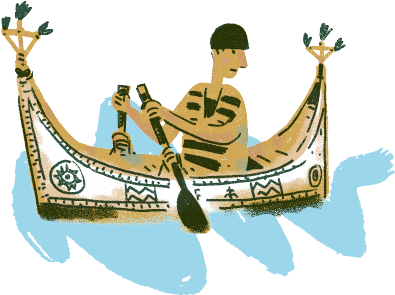

According to a Tao legend, several Tao people went searching for food along the coast and accidentally discovered a winged fish, never before seen. After catching the fish, they cooked it with other fishes and shellfish, and upon consumption, sores began developing on their skin. The Black-winged Flying Fish King later appeared in the dream of an elder in this community and told him the cause of the sores and how to prevent them. He was also cautioned that the flying fish caught must be cooked in its own pots and plates and never with other ingredients, then requested that the elder come and meet the flying fish king the next day on the coast.
The next day, the elder went to the coast as agreed, and met the black-winged flying fish that was in his dream. The black-winged flying fish began introducing the different types of flying fishes, their season, ways to catch and kill them, and how to sun-dry and cook flying fish, as well as relevant taboos, all the rules and knowledge regarding the Flying Fish Ritual and flying fish season. These customs were therefore passed down and became the traditional etiquette of the Tao life.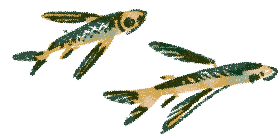
The Tao Perspective of Territory and Border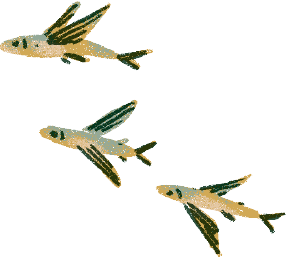
Under the influence of administrative land demarcation practiced after the Nationalist Government came to Taiwan, the concept of community border of the contemporary Tao people is increasingly confined to the lines on the map. However, in the early days, ancestors would use specific landscapes as community borders, and extending from the community borders towards the ocean would be the dividing line of community fishing grounds. Although the current division between Iraraley Community and Iranmeylek Community is Lion Couple Rock, pushing back in time, the community border would have changed repeatedly with discussions or fights between the two communities.
In traditional society, communities respect the land boundary of their traditional territories and abide by relevant rules. Therefore, many community conflicts originated from fighting for resources across the border. For example, millet farming beyond community territory, and fishing for flying fish beyond community border outside the flying fish season. (During the flying fish season, communities are allowed to trespass community borders and fish for flying fish in the water territory of other communities, details to follow later.)
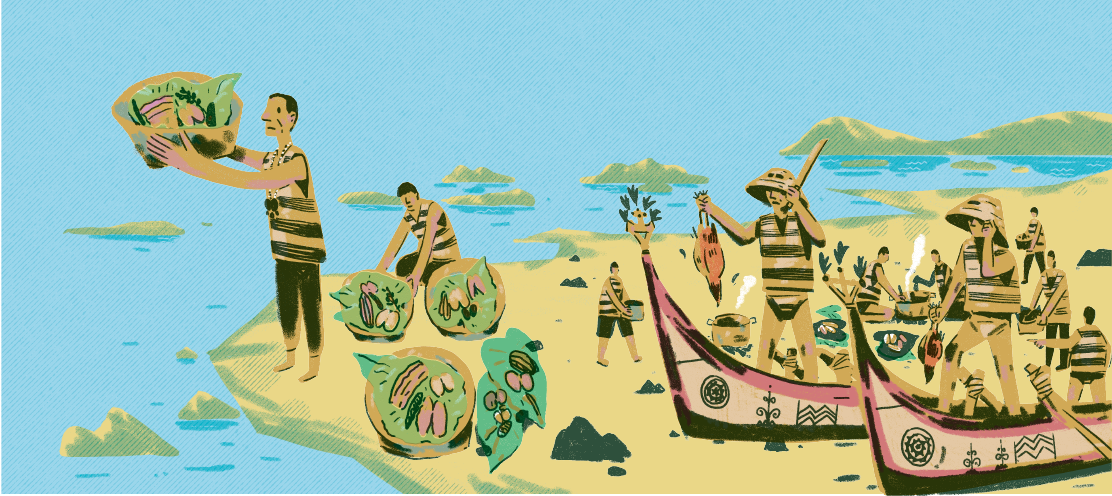

Flying Fish Ritual
Tao marine activities mainly occur in two periods, during the flying fish season (including mivanwa, the Flying Fish Ritual), and outside the flying fish season.
The traditional Tao night calendar does not follow a regular timing but instead depends on the leap month and tides, and mivanwa is generally held after the Lantern Festival. Following the order of locations, the Kuroshio Current passes through, starting from the Imaorod Community, Iratay Community, Ivalino Community, Yayo Community, Iranmeylek Community, and finally Iraraley Community. On the day of the Flying Fish Ritual, all the men in the community must gather on the beach, if a toddler can walk, he must join as well. Those who do not take part in the community Flying Fish Ritual would be presumed dead or critically ill.
Days before the Flying Fish Ritual, people will push their big boats onto the beach. On the day of the ritual, family members will stand in a line behind the big family boat, slaughter a piglet or chicken as a sacrifice, and pray for the flying fish season. In the meantime, a community meeting would be held during the Flying Fish Ritual, where elders in each family would take part on behalf of the family and take this opportunity to encourage and educate the younger generation. The number of 10-person big boats in the communities (the plank boat comes in chinurikuran, the big size, and tatara, small size) nowadays can no longer fill the entire beach, those that actually do set sail to fish is even fewer, all that they are used for now is in rituals and the annual rowing marine cup competition. One year, a family in Iraraley Community added a pair of oars to a single-person boat during the Flying Fish Ritual and took part in the ritual pretending to be a two-person boat, a move which was criticized by the community; some families without a 10-person big boat will also push onto the beach boats that can carry more than two persons to take part in the ritual.

Flying Fish Season, Minganangana, and Kalimman
The flying fish season begins right after the end of the Flying Fish Ritual. At the beginning of the flying fish season, only big boats can set sail to fish at night, and only scoop nets are allowed. Even though traditional big plank boats have now been replaced by motorboats, some motorboats still follow the abovementioned rule. After two weeks or so, small boats will be pushed onto the beach, and that would be when big boats could use large fishing nets and flying fish as bait to catch mahi-mahi.
After 10-person big boats have completed their mission, the minganangana would follow to recognize and acknowledge the hardship and achievements of the men for fishing. Prior to the minganangana, women in the family would capture large amounts of land crabs and make taro cake to show their appreciation to men in the family. The Harvest Ritual takes place sometime around apiya vehan (the good month, roughly in June), which means the end of the flying fish season. During this time, they would celebrate the bountiful harvest of fruit, millet, sweet potato, taro, and various catch. During the ritual, people would gift one another in the community with their own harvest. The ritual connects families and friends, and elders in the family would ask the younger ones to bring food as gift to other households so their children can get to know family relatives.
In the old days, dried flying fish do not preserve well, therefore there is the kalimman (the final month for flying fish consumption, roughly from September to October). Nowadays, refrigerators are common, so it’s up to individuals or families to decide whether or not to continue consuming the flying fish after the kalimman.

Mipazos
The end of the year is the kapitowan month of the Tao (roughly around November), a time to worship ghosts and deities. In the old days, on the day of mipazos, the ghost and deity ritual, every household would place two sets of offerings on the roof for the deities and family ancestors respectively. Nowadays, most families only make offerings to the deities but no longer their own ancestors, which is probably the result of the change in religion.
At the beginning of the ritual, the family leading the ritual will initiate the offering, which is then followed by other families by placing their offerings onto the roof in turns. The Iraraley Community mainly holds their ritual in the community whereas other communities place their offerings by the sea for the ritual. What is worth noting is the taboo of mipazos. On the day of the ritual, everyone is prohibited from entering the mountain because the ghost might come down the mountain to consume their offerings, so one would definitely be affected if you enter the mountain during this time.
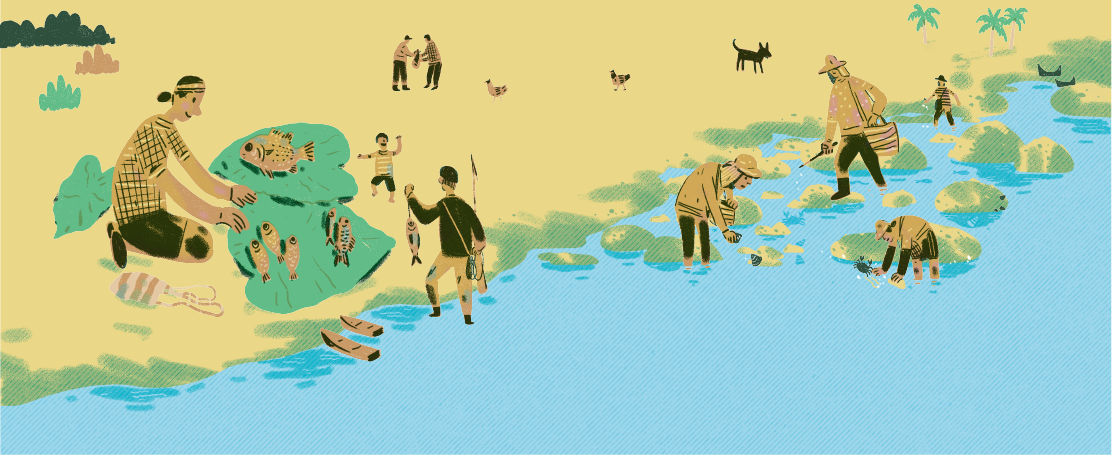
The Code of Ethics for the Fishing and Gathering Culture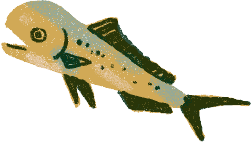
When setting sail to catch the flying fish during the flying fish season in Orchid Island, one is not confined to the community borders and can fish wherever the flying fish school swims. After fishing is done for the day, they would scale the fish on the beach or at the harbor. If the catch is smaller that day, it would be distributed fair and square to every participant while on the boat. What is interesting is that the boat and fishnet are also considered participants to the catch, so they would get a share of the catch as well, which would go to the boat owner. If the fishnet is publicly owned, there would be no extra quota for the fishnet. If the catch is big, it would be shared with other crew members who did not take part in the catch.
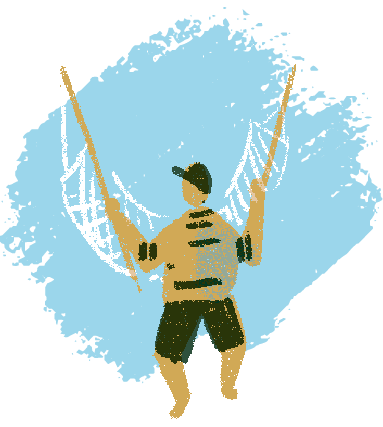
The flying fish season is the most important time of the year for the Tao, and the many taboos are there to respect nature for such provision. Spearfishing is prohibited during the flying fish season; one must not cast stones onto the beach and should watch their behavior and speech; the scaling of flying fish and hanging the fish onto racks must be completed before the sun sets, if the sun is already about to set, they would rather leave everything for the next morning. If taboo is accidentally violated, a piglet or chicken must be slaughtered for purification.
After the flying fish season ends, the entire island again resumes the traditional territory borders between communities, and people can no longer trespass into other communities for spearfishing and fishing. People generally believe that when you trespass to fish, you are acting in the belief that there is no one left in the community or that you consider the entire community lazy, therefore, out of respect, they do not easily trespass.
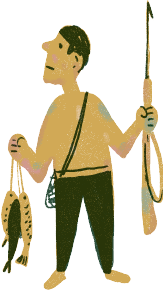
The Tao has some lesser well-known cultural features, for example, you can only obtain resources from the ocean or in the intertidal zone once a day, including fishing, gathering, and spearfishing, because going into the water twice a day is considered very greedy. When gathering along the intertidal zone, you must never turn your back to the ocean since you never know when the next wave is coming. Only gather as much as you can consume, if you do not cease gathering by sunset, you will be tempted by the spiritual world, and danger tends to ensue when there is a lack of light or cannot see clearly, therefore one must never over-gather.
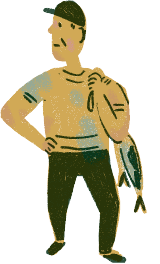 With the modern concept of conservation emerging, indigenous persons practicing traditional activities are often questioned. But for indigenous peoples, we do not need to go out of our ways to practice animal conservation because the rules followed by our ancestors were derived from the life habits of animals. For example, we catch seasonal fishes including the flying fish and mahi-mahi during the flying fish season, which allows the demersal fish to reproduce and restore population during this period. From October to the following January each year, the northeast monsoon brings strong waves and people refrain from fishing at sea and gathering, which also provides the environment of the Orchid Island with natural protection and time to recover.
With the modern concept of conservation emerging, indigenous persons practicing traditional activities are often questioned. But for indigenous peoples, we do not need to go out of our ways to practice animal conservation because the rules followed by our ancestors were derived from the life habits of animals. For example, we catch seasonal fishes including the flying fish and mahi-mahi during the flying fish season, which allows the demersal fish to reproduce and restore population during this period. From October to the following January each year, the northeast monsoon brings strong waves and people refrain from fishing at sea and gathering, which also provides the environment of the Orchid Island with natural protection and time to recover.
